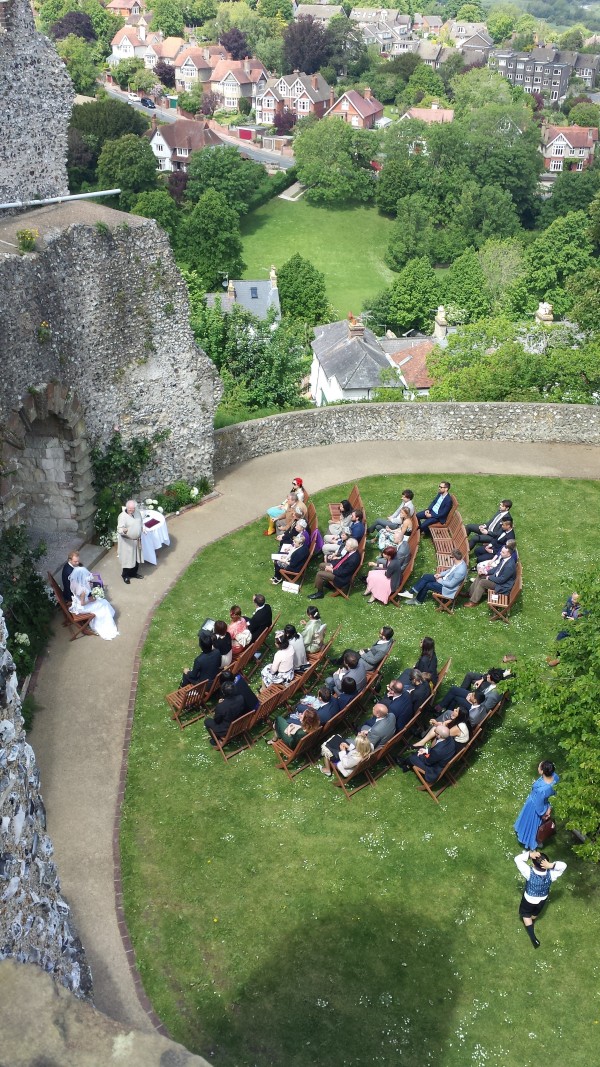
by Michael | May 5, 2015 | Blog
Just how easy is planning a wedding ceremony?
Well, OK, six steps may be over-simplifying it a bit, but the principles I’m about to suggest will be a great starting-point.
Bear in mind that not everybody will want the same thing for their wedding, so these comments may be of varying importance or relevance to people with different budgets, of different religions (or none), or with different ideas of scale, etc.
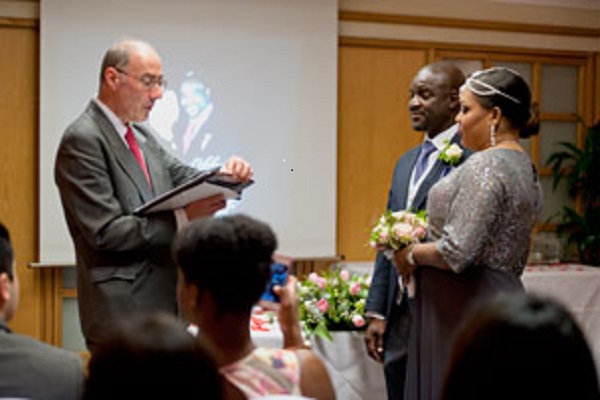
So here goes:
- Whether or not you will marry in (say) church or in a civil ceremony, you will need to give official notice of your intentions. Consult with your priest or local register office to get the legal low-down, but, as with all your preparations, allow plenty of time for this.
- You will need to book your venue well in advance. If you are choosing a civil ceremony, do go and visit the venue, so you can see if it fits in with your dreams.
- The reception may be in a different venue, but, either way, go along and book it earlier rather than later. Start thinking also about who to invite and, eventually, about seating plans, if any.
- Book your civil celebrant well in advance (they get booked up too). Meet them first (or, at least, Skype them), because you’ll want to be sure there’s going to be rapport between you. After all, you’ll have to work quite closely with them. You’ll need to decide on the type and tone of service you’ll be having. (Obviously, there’s much less freedom here if you’re having either a full religious service or else a register office ceremony.) If you’re having a civil ceremony, you’ll want to discuss the content, so that it can be personalised for you. Finally, make sure you are happy with the Ts and Cs before making your final decision (as with all your suppliers). An excellent place to start looking is at www.vowsthatwow.co.uk – well, I would say that!
- Start thinking about the music you want to include. (Again, your celebrant should be able to advise you.) Consider the sound system and also any musicians you may want to use.
- Start booking your other suppliers. These may include florists, a toastmaster, photographers/videographers, cake-makers, caterer, dress or suit supplier, post-ceremony entertainer, hair/beauty treatment, guest accommodation, etc.
If you want a concise, easy-to-follow (and modestly-priced) guide that will take you virtually every inch of the way, then have a look at my recently-published “Your Wedding Guide”.
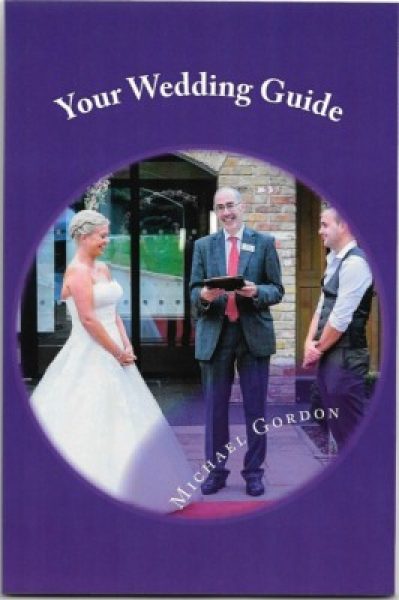
by Michael | Apr 29, 2015 | Blog
An insuperable obstacle?
Planning a wedding is a pretty daunting prospect. You may just be lucky, and have wise advisors and experienced, understanding support. The chances are, though, that it’s new to you, and you’re going to have to do the best you can. You’ll have to make – and learn from – your own mistakes. Some may be expensive.
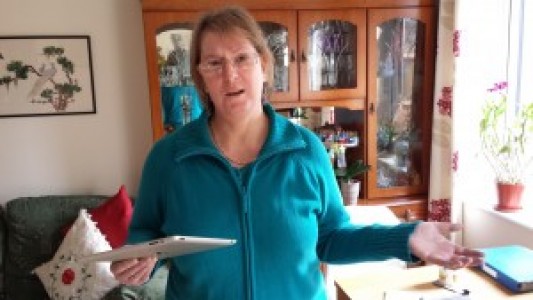
An amazing solution
That sounds pretty grim. However, would you be prepared to spend about £5 to get a dependable, easy-to-follow guide?
If so, you have come to the right place!
As part of my role as civil celebrant, I frequently come across couples swimming in a sea of bewilderment and despair. There’s not a lot of help out there for them – although there is at least the option of an event planner. Naurally, these don’t come cheaply.
What if there was a guide that they could buy for ‘peanuts’, that would lead them gently and securely towards the Eldorado of a successful wedding? Towards a unique, memorable and meaningful day? That would offer them great ideas? Something that they could consult at every step of the way?
Well, look no further.
I am proud and excited to announce that I have put the proverbial pen to paper (except it’s all been done by computer, of course) and produced a handbook specifically aimed at helping couples get on their way with a minimum of fuss or difficulty. That’s not to say that there isn’t still hard work to be done, or time and money to expend. Of course, there is, but you can at least be sure that you are progressing, covering most eventualities and not going round in circles.
What areas are covered?
Some of the areas I look at include:
- choice of ceremony and celebrant
- the service: rituals, vows, music, etc.
- ‘team’ roles
- speeches
- guests
- children
- same-sex weddings
- hiring professionals
- social media
I don’t pretend to have something for absolutely everyone (budgets, as well as taste, will vary enormously), but I am convinced that there is so much in the wedding guide for everyone (from first-timers to wedding planners!).
I am delighted to be the one to fill what seems to be a huge gap in the market.
If you know somebody who might benefit from this handbook, please put them in touch with me. It’s easy to buy: just click here, and you’ll be through to Amazon.
I am not actually anticipating a million-seller block-buster, but I am really excited to be offering practical help to couples, so that they can have the wedding they are dreaming about!

by Michael | Apr 22, 2015 | Blog
An innocent invitation
My wife and I were invited to a wedding recently – I am more used to being the Civil Celebrant than a wedding guest, so the boot was on the other foot this time! The couple were starting a new home together and had a Wedding List from John Lewis.
So we had a look to see what we could get them.
I had dire images in my mind of ridiculous, extravagant presents that we could never afford to buy, but fortunately they were requesting a range of items varying from about £25 to a couple of hundred pounds. As long as you got in fairly quickly, you could buy what you wanted without necessarily bankrupting yourself.
A more demanding invitation
But what if they had been requesting the contents of the Bank of England vaults (assuming anything is there)?
What if they had been having the wedding in some tropical paradise?
Would it have had to come down to deciding whether or not to attend because the demands on our pockets were too great ?
We would have been really sorry to have missed that wedding (on a number of counts). Marriage was important to them (as it is to us). Also, our friendship presumably was too.
In this instance, as I’ve have said, we weren’t placed in the dilemma of having to decide whether to attend or not. But what if we had been?
Between the Devil and the Deep Blue Sea
If your emotions tell you one thing, but your head tells you another, can there be a compromise? Well, I’d say so.
Of course, you could make some excuse about unavailability, which would avoid embarrassing yourself by giving the real reason. That doesn’t help, though, if your heart is set on attending. (Incidentally, if you’re not going to show up, give maximum warning so that someone else could possibly be invited in your stead. And certainly ensure that you don’t leave it so late that the couple are charged for the meal you’ll not be consuming.)
But how about being up front? “I’d love to come to your wedding, but my budget doesn’t stretch that far at the moment. But maybe we can take you out for a lovely dinner [or a show or something equivalent that is affordable] at another date?”
That way, at least you show that you do value their friendship.
Moreover, send them a lovely, personal congratulatory good wishes card, which is a lovely touch.
And going out with them for that meal or show means you’ll be spending quality time with your friends. Not something you can do at a wedding, of course.
So perhaps there is a viable alternative to breaking the bank when it comes to being a wedding guest.
by Michael | Apr 14, 2015 | Blog
Nowadays, same-sex weddings are legal in England & Wales and increasingly popular. Nonetheless, this is a field which may cause major opposition from the family. Let’s therefore take a serious look at this issue.
The guest list
All weddings face the inevitable question: whom do you invite? Selecting your guests is a tough one to answer at the best of times. You will probably start with close family and friends, but what if your closest relatives oppose your union?
Rejecting the rejectors
If it looks like relatives will boycott your wedding, do you go with the flow and simply not invite them? Isn’t it better all round to opt for your friends and (supportive) relations? After all, you’re likely to be spending a huge amount of money on the reception. Why should you have to accommodate people who won’t accept what you’re doing and, at worst, might even turn out to be trouble-makers?
No one would blame you for thinking twice before inviting people openly hostile to your union. On the bright side, they might decline and at least you’ll have gained kudos by having extended the olive branch!
An olive branch
Another advantage that might be gained from inviting disapproving relatives is that they might, albeit grudgingly, attend and – who knows? – eventually enjoy a tasteful and personalised ceremony. Wouldn’t that be something if you were able to ‘convert’ them and retain – even develop – a relationship with them?!
For many of us, there is the bond of love that unites us with our families. We may not always like our relations, but to upset and potentially do without them for the rest of our lives is something we would do only when all else has failed. Giving them a chance to stay connected with you (even loosely) is surely worth the effort.
If the worst comes to the worst, at least you’ll know you tried. And you could gain such a lot, if you can bring those relatives together with you.
Come what may, your wedding will be a commemoration of love, with promises for the future. It’s not the day to heal rifts, but it may be the pathway to do so, and that is something which should be embraced.
A few thoughts
Why should a gay wedding be drastically different to a traditional, heterosexual one? There’s no reason why women should not be in white, and carrying bouquets of lilies. Men can certainly be in suits. The wedding day is the most important day of their lives, and they are entitled to choose to mark it by looking their very best. The affair can be elegant and tasteful – and, in my view, should be.
Gay marriage is legal in most States of the US and is becoming commonplace in the UK too, so we all need to become more comfortable with the concept.
In a ‘traditional’ gay wedding, there are some questions to consider: should there be “bridesmaids” – or even whatever the masculine equivalent is? Or a combination of them? And what about surnames? Should either of the pair change their name after marriage? If so, which one? Presumably, that will be down to choice.
There may be some decisions for the officiant: instead of “you may kiss the bride”, the easiest thing would simply be “you may kiss”.
Of course, at present, there’s not really much of a precedent for gay marriages, so the traditions are up for grabs. But do we need to invent any, actually?
To find a civil celebrant for your personalised ceremony, look no further than https://vowsthatwow.co.uk/civil-weddings/
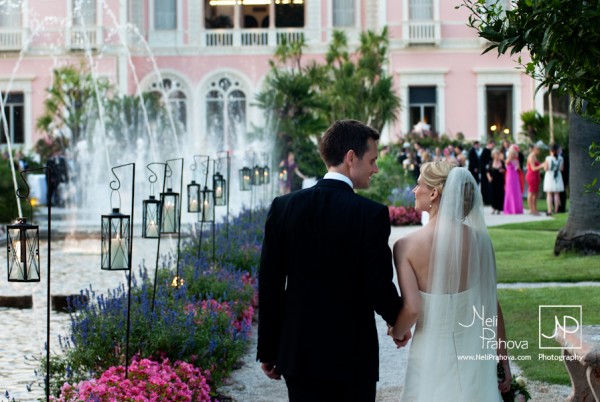
by Michael | Apr 7, 2015 | Blog
Most people think that they can only get married in a religious building like a church or at a register office. More enlightened people may know that they can choose licensed buildings (usually certain hotels or restaurants) too. However, there are other options, if you’re looking for a unique wedding venue.
The legal bit
If you are going for an unlicensed venue, you need to be aware that you still have to cover the legal part of the ceremony by marrying in a register office. You don’t need to make a big thing of this part of the ceremony. Just make an appointment and show up with two witnesses. Then you can head off to the venue of your dreams.
If you’re using a licensed building, then the registrars will come along conduct their ceremony.
Alternative venues
The world is almost literally your oyster when it comes to choosing your venue. Of course, you must expect to pay for it, so doing your homework is essential. That applies to outdoor locations too. Don’t forget that someone somewhere owns the land you will want to use, so, at the very least, ensure you ask permission first.

A few choices
A couple of places where I have officiated (and I’m not including lovely places like the Royal Box at Epsom racecourse) are Old Sarum (an Iron Age fort overlooking Salisbury) and in a secluded grove at a Canal Boat centre. They were very special. (I am also hoping for the Shard in London!)
Obviously, there’s no way I can give an exhaustive list of venues you might not have thought of (or anything approximating to one). However, I thought it might be helpful if I suggested twenty different places you could consider. Here goes!
1. An art gallery
2. An alpaca farm
3. A supermarket (really! It’s been done!)
4. A castle or stately home
5. A mountain top
6. A ferry or boat
7. A desert/forest/bridge
8. A tent/yurt/marquee
9. A lakeside
10. A hot-air balloon
11. A cliff-top (with great care!)
12. On a glacier/by a snowdrift
13. A bowling alley (yes, it’s feasible)
14. A field
15. A beach
16. A museum
17. A canal boat
18. Botanical gardens
19. A lighthouse
20. A zoo.
Hopefully, these suggestions will give you something to think about, when you look for your unique wedding venue (and wedding).
And they are all venues I’d be more than happy to attend if you invite me to conduct your bespoke ceremony!
by Michael | Mar 24, 2015 | Blog
I’m a dinosaur. I’m not entirely proud of the fact, and occasionally do manage to move with the times a bit. But I am gradually coming to terms with the fact that social media in the wedding world are here to stay.
Certainly, seeing photos online the day after the wedding is very desirable.
However, I feel that the occasion is diminished by legions of smartphone-users raising arms every moment to capture yet another picture. It detracts from the atmosphere, spoils the view of other guests and can ruin the shots of the photographer whom the couple may have paid to be there.
Some weddings are now being referred to as “insta-weddings” because of the social media frenzy they generate.
Couples will have their own opinions. A British study of brides’ expectations shows that nearly half believe it is important to enforce digital rules on wedding guests, with one in seven wishing mobile phones could be banned.
It’s something for you to consider, and here are a few thoughts that may help you make up your mind.
Before the event
• Engagement/wedding
Make sure you inform your family and close friends before posting the news online.
• Invitations
E-vites are an acceptable use of social media.
Invitation replies
Probably safer to ask people to use Royal Mail. You need to track the replies, and this may work out more reliable than FaceBook and the like.
At the event
Rules
In my experience, most couples feel that there should be rules about social media. These rules vary, of course, but many believe that it should be the couple who are the first to post wedding photos on a social media site. A lot also feel that bridesmaids should not be allowed to upload photos of brides before the ceremony.
Whatever you decide, you need to inform your guests clearly. It pays to communicate with your guests.
Of course, people should be welcome to take photos of themselves, if they want.
Afterwards
Do send out ‘thank you cards’ – but not by e-mail or social media. They ought to be hand-written.
Social Media Ideas
In certain cases, friends of the pair may create a hashtag handle for tweeting and photo-sharing. This also ensures that each wedding is distinctive. Useful, if you happen to be invited to a whole lot of weddings in one season.
A bride can nowadays designate a “Tweeter of Honour”, if she has too much to occupy herself with.
Instagrams can show natural, unforced moments. Nonetheless, it’s very rare that such photos beat the professional photographer’s shots.
Advantages of photo-sharing are that guests can contribute to a designated wedding album and, of course, those unable to attend, may be able to see photos or even live streams.
Beware of overkill, by the way. Thousands of posts before the wedding will be a turn-off.
Whether or not you opt for social media, moderation is advisable – and do make sure you communicate your wishes to your guests.






